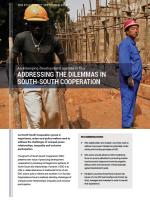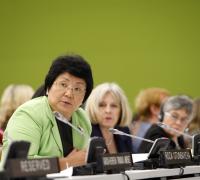Revisiting South-South Cooperation – A viable alternative to traditional aid?
The long awaited Sustainable Development Goals to be adopted at the UN General Assembly in 2015 highlight South-South cooperation as an important development modality and presents an opportunity to address the prospects and challenges of SSC.
In this policy brief Kristoffer Nilaus Tarp and Signe Cold-Ravnkilde argue that if SSC is to offer a viable alternative to traditional forms of aid, SSC actors, policy makers and southern Civil Society Organisations have to address standing challenges of unequal power relationships, inequality and inclusive participation.
They argue that, as developing countries increasingly turn to SSC as the assistance model of choice, the “founding principles” of SSC must be revisited. The growing importance of a handful of southern assistance providers has fundamentally changed the power dynamics of SSC and continues to challenge the principles of equality, non-interference and mutuality. While this development may be inevitable, it should trigger renewed debate, particularly among recipient countries, on how SSC partnerships are formed, defined, managed and evaluated.
The authors therefore argue that:
- SSC stakeholders and recipient countries need to address new power imbalances potentially undermining the founding principles of SSC.
- SSC actors should adhere to SSC’s traditional focus on poverty alleviation by ensuring positive local economic impacts and averting negative effects within the framework of internationally agreed development goals.
- Recipient countries should have inclusive dialogues on how SSC partnerships are formed, defined, managed and evaluated in order to benefit their populations.
DIIS Experts



